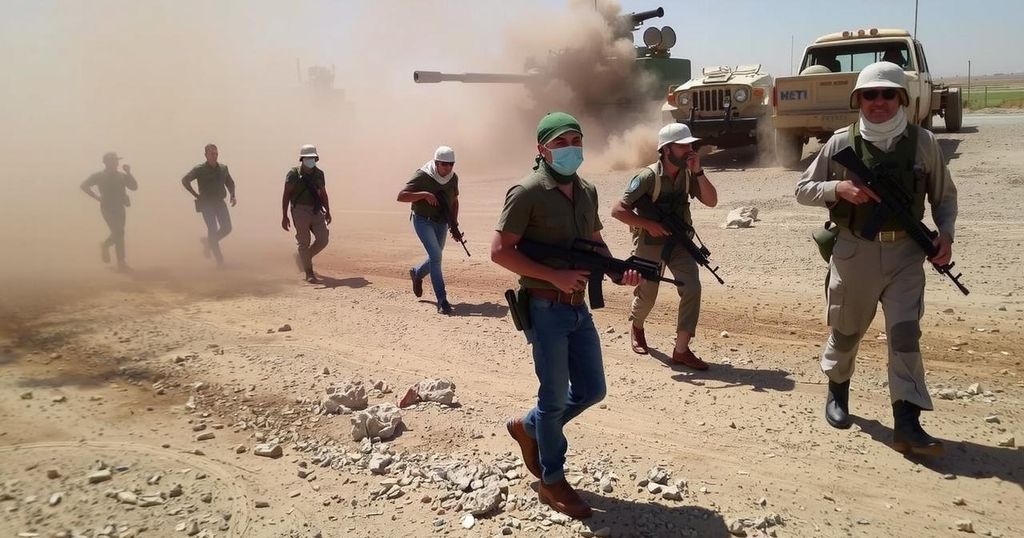Syria’s Renewed Conflict: Rebel Advances and the Uncertain Fate of Assad
The recent escalation of conflict in Syria, following the Hamas attacks on Israel, has led to a surprising offensive by rebel groups, notably Hayat Tahrir al-Sham (HTS), against Bashar al-Assad’s forces. Despite setbacks for Assad’s allies, such as Iran and Hezbollah, the regime retains control over major urban centers. The complexities of local factions highlight ongoing instability, with international implications stemming from the conflict’s evolution.
The conflict in Syria has reignited, influenced by the broader turmoil in the Middle East following the October 7 Hamas attacks on Israel. This series of events has escalated the war, which has remained unresolved since 2011, when Bashar al-Assad’s regime began its fight for survival. Despite heavy losses among Assad’s allies—particularly Iran and Hezbollah—who have suffered significant military setbacks due to Israeli actions, Assad continues to rely on the support of Russia, even as its focus shifts increasingly towards the war in Ukraine.
In recent weeks, the rebel coalition led by Hayat Tahrir al-Sham (HTS) has executed a surprising offensive, reclaiming strategic positions lost in the last decade of conflict. They have captured critical territories, including Aleppo, a city once seen as a stronghold for the Assad regime. This resurgence of rebel activity underscores the complexities of the Syrian conflict, characterized by a mosaic of groups vying for power both locally and in the broader geopolitical landscape.
HTS, with its roots in al-Qaeda, has attempted to rebrand itself to expand its appeal and distance its operations from jihadist ideologies. The group’s leadership understands the necessity of fostering a more moderate image to gain civilian support against a common enemy—Assad’s regime. The local populace, wary of extremist narratives, may find themselves drawn back to HTS, particularly as sentiments against regime brutality persist.
The current dynamics of the conflict reveal the ongoing fracturing of allegiance among forces in northern Syria, where various political and military factions vie for control. With reports of captured military assets and advances towards key cities, the situation could escalate rapidly, prompting responses from Assad’s forces and their limited remaining allies. In light of these developments, international observers express concern for local civilian populations and the implications for regional stability.
The UN envoy has emphasized that military solutions alone cannot resolve the conflict, pointing out the stagnation in diplomatic initiatives aimed at a peaceful resolution. The vision for Syria calls for a political transition rooted in a new constitution and free elections, yet the Assad regime has consistently resisted relinquishing its grasp on power. Ultimately, while challenges remain daunting for the Assad regime, the possibility of renewed threats from anti-Assad factions reflects the fragile and unpredictable nature of the conflict.
The Syrian civil war began in 2011 as part of wider anti-government protests across the Arab world. President Bashar al-Assad responded to the uprising with violent repression, leading to a prolonged conflict that has witnessed the fragmentation of various Syrian factions, foreign interventions, and significant humanitarian crises. International dynamics have shifted dramatically due to the involvement of global powers like Russia and Iran, alongside regional actors. The conflict has persisted for over a decade, characterized by shifting allegiances and ongoing violence despite intermittent periods of relative calm.
In conclusion, the recent offensive by rebel groups in Syria signals a resurgence of conflict that complicates the already precarious situation for the Assad regime. Although the regime has maintained control over key urban areas, its military and political future remains uncertain as it faces renewed challenges. The broader implications for regional stability could provoke international responses as the conflict continues to evolve against a backdrop of entrenched divisions and complicated geopolitical interests.
Original Source: www.bbc.co.uk




Post Comment